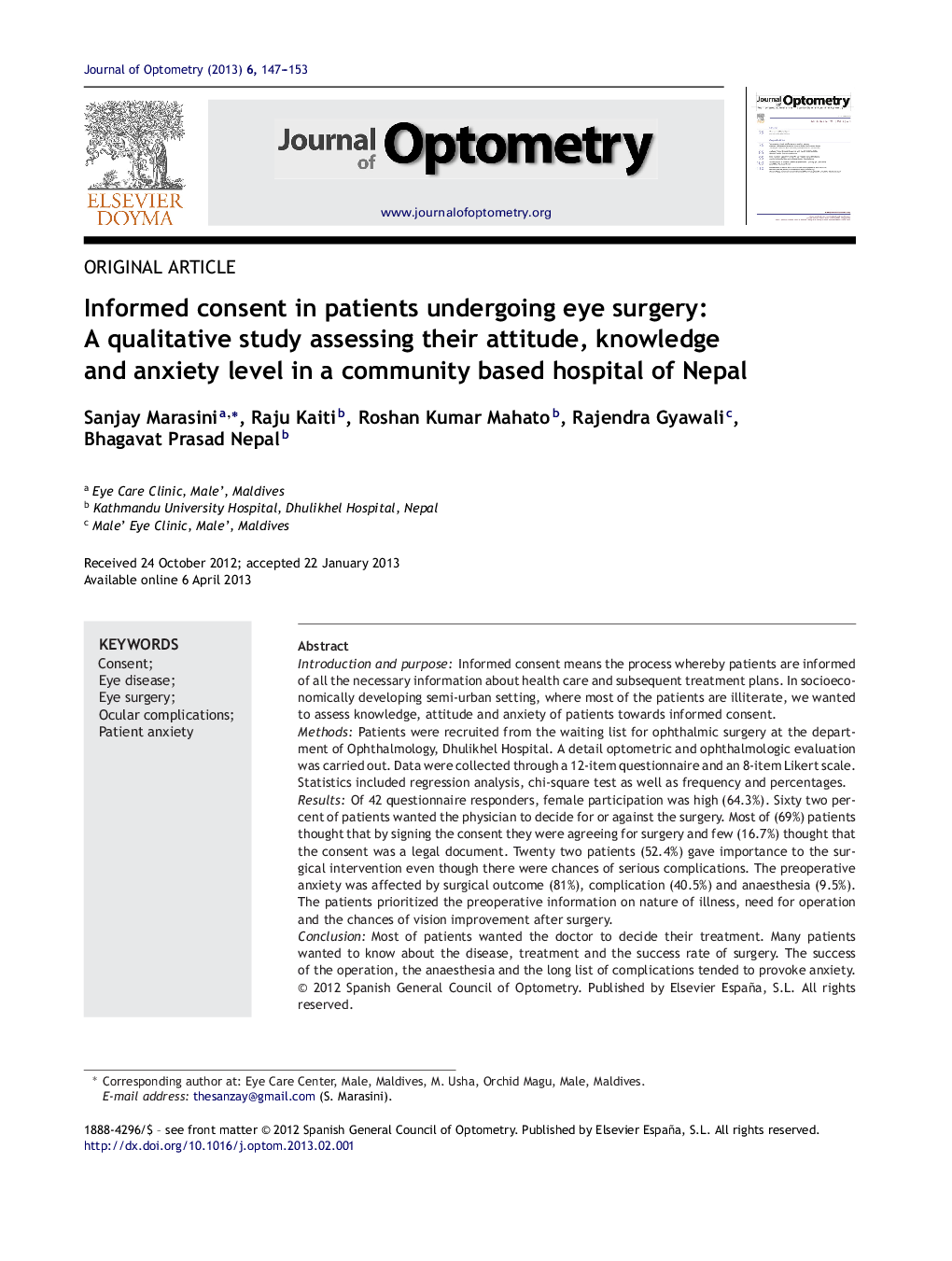| کد مقاله | کد نشریه | سال انتشار | مقاله انگلیسی | نسخه تمام متن |
|---|---|---|---|---|
| 2700837 | 1144374 | 2013 | 7 صفحه PDF | دانلود رایگان |

Introduction and purposeInformed consent means the process whereby patients are informed of all the necessary information about health care and subsequent treatment plans. In socioeconomically developing semi-urban setting, where most of the patients are illiterate, we wanted to assess knowledge, attitude and anxiety of patients towards informed consent.MethodsPatients were recruited from the waiting list for ophthalmic surgery at the department of Ophthalmology, Dhulikhel Hospital. A detail optometric and ophthalmologic evaluation was carried out. Data were collected through a 12-item questionnaire and an 8-item Likert scale. Statistics included regression analysis, chi-square test as well as frequency and percentages.ResultsOf 42 questionnaire responders, female participation was high (64.3%). Sixty two percent of patients wanted the physician to decide for or against the surgery. Most of (69%) patients thought that by signing the consent they were agreeing for surgery and few (16.7%) thought that the consent was a legal document. Twenty two patients (52.4%) gave importance to the surgical intervention even though there were chances of serious complications. The preoperative anxiety was affected by surgical outcome (81%), complication (40.5%) and anaesthesia (9.5%). The patients prioritized the preoperative information on nature of illness, need for operation and the chances of vision improvement after surgery.ConclusionMost of patients wanted the doctor to decide their treatment. Many patients wanted to know about the disease, treatment and the success rate of surgery. The success of the operation, the anaesthesia and the long list of complications tended to provoke anxiety.
ResumenIntroducción y objetivoEl consentimiento informado es el proceso mediante el cual se aporta a los pacientes toda la información necesaria en relación a la atención sanitaria y los consiguientes planes de tratamiento. En un entorno semi-urbano, en vías de desarrollo socio-económico, quisimos evaluar el conocimiento, la actitud y la ansiedad de los pacientes con respecto al consentimiento informado.MétodosSe seleccionaron pacientes en lista de espera para cirugía oftálmica del departamento de Oftalmología del Hospital Dhulikhel. Se llevó a cabo una evaluación optométrica y oftalmológica detalladas. Los datos de un cuestionario de 12 preguntas, y de una escala Likert de 8 cuestiones fueron recolectados. Las estadísticas incluyeron análisis de regresión, prueba de χ2, así como estudio de frecuencias y porcentajes.ResultadosDe entre los 42 pacientes que respondieron al cuestionario, la participación femenina fue alta (64.3%). El sesenta y dos por ciento de los pacientes quisieron que fuera el médico quien decidiera a favor o en contra de la cirugía. La mayoría de los pacientes (69%) pensaron que la firma del consentimiento constituía la aceptación de la cirugía, y pocos pensaron (16.7%) que se trataba de un documento legal. Veintidós pacientes (52.4%) otorgaron importancia a la intervención quirúrgica, incluso cuando podían producirse graves complicaciones. La ansiedad pre-operatoria estuvo afectada por el resultado quirúrgico (81%), las complicaciones (40.5%) y la anestesia (9.5%). Respecto a la información preoperatoria, los pacientes dieron prioridad a la naturaleza de la enfermedad, la necesidad de la operación y las posibilidades de mejora de la visión tras a la cirugía.ConclusiónLa mayoría de los pacientes quisieron que el médico tomara la decisión sobre su tratamiento. Muchos pacientes solicitaron información relativa a la enfermedad, el tratamiento y el porcentaje de éxito de la operación. Dicho éxito, la anestesia, y la larga lista de complicaciones tendieron a provocar ansiedad.
Journal: Journal of Optometry - Volume 6, Issue 3, July–September 2013, Pages 147–153